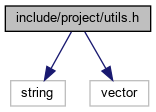Utility functions for file system operations. More...
#include <string>#include <vector>

Go to the source code of this file.
Functions | |
| std::string | getExecutableDir () |
| Gets the directory containing the current executable. More... | |
| void | checkFolder (std::string &folderPath) |
| Ensures a directory exists, creating it if necessary. More... | |
| void | deleteFolder (const std::string &path) |
| Recursively deletes a directory and all its contents. More... | |
| std::vector< std::string > | listFilesInDirectory (const std::string &path) |
| Lists all regular files in a directory. More... | |
Detailed Description
Utility functions for file system operations.
This header provides cross-platform utility functions for common file system operations used throughout the CPPNeuronMesher project. These utilities handle path manipulation, directory creation, and file listing.
- Date
- 2025-07-27
- Version
- 1.0
- Copyright
- MIT License
Function Documentation
◆ checkFolder()
| void checkFolder | ( | std::string & | folderPath | ) |
Ensures a directory exists, creating it if necessary.
- Parameters
-
[in,out] folderPath Path to the directory to check/create
This function checks if the specified directory exists and creates it (including any necessary parent directories) if it doesn't exist. The folderPath parameter is modified to contain an absolute path.
- Exceptions
-
std::runtime_error if the directory cannot be created
- Note
- Uses std::filesystem::create_directories()
Ensures a directory exists, creating it if necessary.
- Parameters
-
[in,out] folderPath Path to the folder to check/create
This function checks if the specified folder exists. If it doesn't exist, it attempts to create the folder and all necessary parent directories. Status messages are printed to standard output/error streams.
- Note
- The function modifies the input string to ensure it's in a canonical form
- If folder creation fails, an error message is printed to stderr
- On success, the folderPath parameter will be updated to the canonical path
- See also
- std::filesystem::create_directories() for details on directory creation
- std::filesystem::exists() for details on existence checking

◆ deleteFolder()
| void deleteFolder | ( | const std::string & | path | ) |
Recursively deletes a directory and all its contents.
- Parameters
-
[in] path Path to the directory to delete
This function removes the specified directory and all files and subdirectories it contains. If the path does not exist, the function does nothing.
- Exceptions
-
std::runtime_error if the directory cannot be deleted
- Note
- Uses std::filesystem::remove_all()
- Warning
- This operation is not reversible
- Parameters
-
[in] path Path to the directory to be deleted
This function attempts to delete the specified directory and all its contents recursively. It uses std::filesystem::remove_all() for the operation. Status messages are printed to standard output/error streams.
- Note
- The operation is not atomic - some files might be deleted even if others fail
- If the operation fails, an error message is printed to stderr
- The function will not throw exceptions on filesystem errors
- See also
- std::filesystem::remove_all() for details on the underlying operation
- std::error_code for error handling details
◆ getExecutableDir()
| std::string getExecutableDir | ( | ) |
Gets the directory containing the current executable.
- Returns
- Absolute path to the directory containing the executable
This function retrieves the full path to the directory containing the currently running executable. The path is returned with a trailing directory separator.
- Note
- On Linux, this uses /proc/self/exe to determine the path
- The returned path is guaranteed to be absolute
- The function may return an empty string if the path cannot be determined
Gets the directory containing the current executable.
- Returns
- std::string The absolute path to the directory containing the executable
This function determines the directory containing the currently running executable by resolving the symbolic link at "/proc/self/exe" and returning its parent directory.
- Note
- This implementation is Linux-specific and uses /proc filesystem
- The returned path is always absolute and canonical (no . or .. components)
- On error, the function may return an empty string
- See also
- https://man7.org/linux/man-pages/man5/proc.5.html for /proc/self/exe details

◆ listFilesInDirectory()
| std::vector<std::string> listFilesInDirectory | ( | const std::string & | path | ) |
Lists all regular files in a directory.
- Parameters
-
[in] path Path to the directory to scan
- Returns
- Vector of filenames (not including directory path)
This function returns a list of all regular files (not directories) in the specified directory. The returned filenames do not include the directory path.
- Exceptions
-
std::runtime_error if the directory cannot be accessed
- Note
- The order of files in the result is filesystem-dependent
- Symbolic links are not followed
Lists all regular files in a directory.
- Parameters
-
[in] path Path to the directory to scan
- Returns
- std::vector<std::string> Vector containing absolute paths to all regular files
This function scans the specified directory and returns a list of all regular files it contains. The function only includes files (not directories) in the results.
- Note
- The function returns absolute file paths by default
- The function does not recurse into subdirectories
- If the directory cannot be accessed, an empty vector is returned
- The order of files in the result is filesystem-dependent
- See also
- std::filesystem::directory_iterator for iteration details
- std::filesystem::is_regular_file() for file type checking